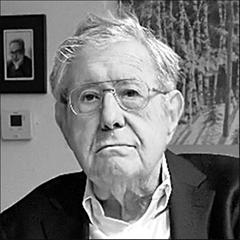Poet and critic David R. Slavitt, who "wrote more than 130 books, mostly collections of poetry and translations of classics, as well as lowbrow novels under a pen name," died May 17, at the age of 90, the New York Times reported. Slavitt's work included translations of Virgil, Ovid, and Seneca, and his poetry "exhibited a mastery of traditional forms, though in a contemporary voice packed with wit and erudition."
 |
|
| David R. Slavitt | |
His writing résumé also had another side. In 1966, as an up-and-coming poet and novelist in New York City, he was having lunch with publisher Bernard Geis, who had just released Jacqueline Susann's Valley of the Dolls.
Slavitt had just written "a scathingly funny review" of Anya Seton's novel Avalon for the New York Herald Tribune, and Geis asked him to write his own Valley of the Dolls, the Times noted, adding that Slavitt initially resisted because he had a "serious" novel, Rochelle, or, Virtue Rewarded, coming out later that year. He did, however, propose an alternative. Under the pseudonym Henry Sutton, he wrote The Exhibitionist, "about an actress and her rich father, appeared in 1967. Tame by today's standards, it was decried as near pornography. And it sold four million copies." He went on to write seven more novels as Sutton, including The Proposal (1980), and even used the name of his first wife, Lynn Meyer, for a mystery novel, Paperback Thriller (1975).
"The theory was that it would be nice to make some kind of distinction between the two kinds of work, and the two kinds of audiences," he said in an interview with Terry Gross on Fresh Air in 1978. "When Longines makes a cheap watch for wide sale, they call it a Wittnauer."
Under his own name, he wrote a bawdy "children's book" titled The Cock Book, or, The Child's First Book of Pornography (1987); as well as a 2006 memoir, Blue State Blues: How a Cranky Conservative Launched a Campaign and Found Himself the Liberal Candidate (and Still Lost), about his unsuccessful 2004 run for the Massachusetts State House of Representatives.
Slavitt's "serious" novels include the comic Anagrams (1970), about a poet invited to speak at a literary festival where no one has read his work. His first poetry collection was Suits for the Dead (1961) and his final one, Last Words, is scheduled for publication in 2028. He also wrote the libretto for an opera about the welfare system, based on a film by the Frederick Wiseman, and a play, King Saul, which made its debut Off Broadway in 1967.
"I do what entertains me," he told the Philadelphia Inquirer in 1996, adding that he was able to write so widely because "I have an absolute absence of any kind of fear."
Prior to becoming a full-time author, Slavitt worked at Reader's Digest, taught at the Georgia Institute of Technology and received a master's degree in literature from Columbia University before joining the staff of Newsweek in 1958, where he focused on criticism and became a movie reviewer and editor. He left the magazine in 1965.
"Though he wrote fiction at the same rate that he turned out poetry, he considered himself a poet first and foremost, writing novels and ephemera on the side to make enough money to raise a family," the Times noted.
"If I had been in it just for the money," he told the Philadelphia Inquirer, "I would've gone where the real money is: Business."

